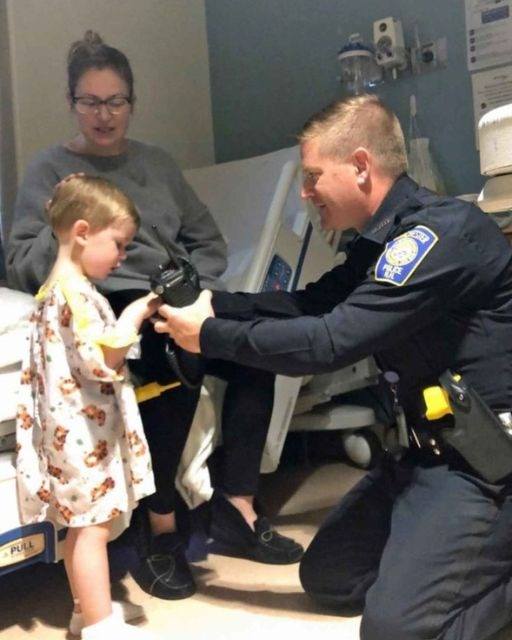We were at the hospital for what was supposed to be a routine overnight stay. My son, Milo, was battling a chest infection that had unexpectedly worsened, and the doctors wanted to monitor his oxygen levels. It wasn’t life-threatening, but as a single parent sitting alone in a sterile, machine-filled room, it was more than enough to be frightening.
Milo was in a mood—completely withdrawn. He wouldn’t eat, refused to talk, and didn’t even glance at the cartoons playing on the screen. I was running out of ways to comfort him when there was a knock at the door.
A police officer stepped in, smiling warmly, his voice calm and kind. One of those community officers, clearly there to uplift spirits. “Heard there’s a brave young man in here,” he said gently, crouching beside Milo’s bed.
Milo barely reacted.
Still, the officer kept chatting, cracking a light joke about donuts. Then he reached for his radio and asked Milo if he wanted to say hello to “headquarters.” Milo blinked, curious, and gave a slight nod.
The officer handed him the radio.
Milo held it like it was something magical. He pressed the button and softly said, “Hello?”
There was a moment of static, and then a voice replied:
“We’ve been waiting for you. We need your help.”
That one sentence changed everything. Milo’s whole demeanor shifted. He smiled for the first time in days, sat up straighter, and started asking what kind of help they needed. I heard something in his voice I hadn’t heard in weeks—a spark.
As the officer stood to leave, he quietly placed something in Milo’s lap. It looked like a badge. But it wasn’t a toy—it was real. Solid. Weighty.
I flipped it over and saw a date engraved on the back:
October 14, 1987.
Exactly 36 years ago to the day.
There was something strange about holding that badge. It didn’t just feel heavy—it felt charged with a kind of history. The officer simply tipped his hat and left without another word, leaving me stunned as Milo clutched the badge like treasure.
“Mom,” he whispered, eyes wide, “what does this mean?”
I had no answer. Who gives a sick child a real police badge from decades ago? Was it a mistake? Or was it meant for someone else entirely?
That night, after Milo drifted to sleep with the badge tucked against his chest, I couldn’t stop thinking about it. Who had it belonged to? Why had the officer given it to Milo—why today?
The next morning, while Milo slept, I started searching online. I entered the badge number. To my surprise, information popped up right away. The badge had belonged to Officer Raymond “Ray” Callahan, a city policeman who died in 1987 while saving two children from a house fire.
My heart sank. This was no ordinary badge—it was a symbol of sacrifice and heroism.
When Milo woke up, he was different. Lighter. Energized. He peppered me with questions about Ray, about police officers, about bravery. By lunchtime, he had memorized most of what I’d found online. It was as if the badge had lit a fire inside him—one I hadn’t seen in a long time.
That afternoon, just as we were preparing to leave the hospital, another visitor arrived. A woman, late sixties, with silver hair and eyes full of kindness. She introduced herself as Evelyn Callahan—Ray’s widow. She’d heard through retired officers that the badge had somehow reached Milo. And she needed to meet him.
She brought stories, old photographs, and even Ray’s uniform cap. Milo listened, fascinated. And as he absorbed her words, I saw something remarkable—he wasn’t just listening. He was connecting.
Before leaving, Evelyn handed him a small leather notebook—Ray’s personal journal. Inside were handwritten notes about courage, honor, and compassion. One entry in particular stood out:
“Sometimes, the bravest thing you can do is believe in yourself when no one else does.”
That line stayed with Milo long after Evelyn was gone. In the weeks that followed, his recovery was astounding. Doctors called it extraordinary. I knew better—it wasn’t medicine. It was meaning.
And then came the twist no one expected.
One evening, Milo was flipping through Ray’s notebook again when he stopped at a page with a faded sticky note. Written in Ray’s handwriting was an address—and beneath it, a simple message:
“If you ever doubt your path, go here.”
